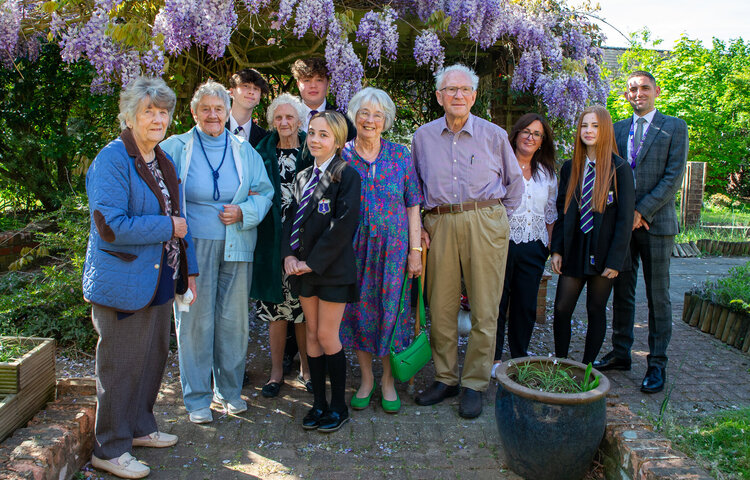Religious Education

Subject Overview
Religious Education is one of the richest subjects in the school curriculum – tackling the big philosophical questions in life. As well as developing factual knowledge of moral and religious beliefs, it encourages students to ask questions about life and develops attitudes of confidence and thoughtfulness about themselves – skills which are needed to face common issues in the 21st century.
Following the Agreed Syllabus for Lancashire, students are encouraged to explore ‘shared human experience’, ‘beliefs and values’, ‘religious traditions’ and ‘personal meaning’.
Teachers are passionate and dedicated in their commitment to provide an inclusive and nurturing education. Students are valued for their opinions and encouraged to develop their analytical and critical thinking skills to encourage academic progression.
Religious Education Staff
Mrs Cadman - Teacher of RE / Head of Foundation Faculty
Miss Rowe- Teacher of RE
Key Stage 3 overview 2025/26
Y7: All units to incorporate the use of SOWA (sources of wisdom and authority) How to access and apply SOWA will be a key theme within each unit (supports extended writing questions in GCSE)
HT1 -Creation - Christianity: Students will be asked to think about creation and stewardship. Students will consider ideas about God and the use of symbolic language. Students will learn about Genesis and Interpretations of Genesis, Stewardship and Greta Thunberg, Stewardship and Chico Mendes
HT2 -Celebration - Jewish festivals Students will learn about the various key dates and festivals for the Jewish religion and the reasons behind why they are celebrated. This will include: Covenants and beliefs about God, Shabbat, Moses and Exodus, Pesach, Rosh Hashanah, Hanukah
HT3 -Belonging - Islam Students will learn about key Islamic beliefs and how these unite Muslims around the world. They will study: Beliefs about God, Ummah, Identity: denominations, Identity: 5 Pillars, Islamic Relief and Islam in the local community.
HT4 -Worship - Hinduism Students will learn about key Hindu festivals and the reasons why they are seen as important practices. Key knowledge will include: Beliefs about Gods and deities, Avataras, Puja, Ramayana, Di wali.
HT5 -Equality - Sikhism Students will explore the question of equality through the Sikh religion. Content includes: Guru Nanak, Gurus, Khalsa, 5 K’s, Gurdwara, Langar and Sewar, Sikhism, equality and community.
HT6 - Suffering - Buddhism Students will explore the question of suffering through the study of Buddhism. They will learn about: Siddartha – 4 sights, 4 Noble Truths, the Eightfold Path, Meditation, Worship and the Sangha.
Y8:All units to incorporate the use of SOWA (sources of wisdom and authority) How to access and apply SOWA will be a key theme within each unit (supports extended writing questions in GCSE)
HT1 - World views - Students will develop understanding of various world views, none religious and others
HT2 -Relationships - Students will explore the various family types, religious view on family, the role of family, marriage and challenges within relationships
HT3 -Human Rights - Students will develop knowledge on what Human Rights are, the origins of HR (Holocaust), Children's rights, rights in practice, human rights abuses and organisations that support HR.
HT4 -Worship - Students will understand what worship is, types of Christian worship (denominational), Islamic worship - 5 Pillars, Mosque and the importance of worship
HT5 - Application of skills - Religion and the Search for Meaning - Students will practice all relevant skills - Identify, Describe, Explain and Evaluate through the lens of philosophical search for meaning - meaning of life, evil, suffering etc
HT6 - Ethics - Y9 ready. What are ethics? How we make ethical decisions, Christian and Islamic views on ethical choices, None religious views on ethical issues, Case studies - Animal testing, environmental responsibility
Y9: All units to incorporate the use of SOWA (sources of wisdom and authority) How to access and apply SOWA will be a key theme within each unit (supports extended writing questions in GCSE)
HT1 -Medical Ethics: Students will explore ethical issues relating to medicine. Students will look at both the Christian and the Islamic viewpoint. Content includes: the sanctity of life, IVF, genetic engineering, abortion, euthanasia and organ donation.
HT2 - What is a Soul?: Students will be introduced to the religious concept of a soul, the various philosophical and atheist beliefs around the soul. Students will explore whether near death experiences, ghosts are evidence of the soul
HT3 -The problem of Evil: Students will be continuing with the questions on the existence of God by asking the questions “Is God real?” “if so where is he?” and “Why does God allow evil and suffering?” - a focus on prejudice, discrimination, Judaism, antisemitism and the Holocaust.
HT4 - Is Belief important? - Students will explore the question of what is belief?, Core Christian and Islamic belief, Humanist, Agnostic and Atheist belief, how belief impacts action and a related case study
HT5 -Peace and Conflict: Students will study ideas on peace and war from the Islamic view point. Content includes: Does religion create war? Peace, Pacifism, Just War & Holy War, Terrorism and the use of WMD.
HT6 - Religion and Identity - Students will understand what identity is, gender, racial and sexual and cultural identity and religion, impact of identities which may clash (eg RC and homosexuality)
Key Stage 4 Religious Studies
At Key Stage 4, we follow Eduqas Route A. This specification reflects the fact that the religious traditions of Great Britain are, in the main, Christian, while considering taking into account other principal religions also represented. Students are continually assessed throughout the course, with both formative and summative assessments reflecting the GCSE exam structure. The course is assessed through three examinations at the end of year 11.
“Science without religion is lame. Religion without science is blind”
Albert Einstein
“All that is necessary for the triumph of evil, is that good men do nothing”
Edmund Burke
*Parents have the right to withdraw their children from some parts of RE teaching. Should you wish to discuss this option, please contact the Headteacher via ask@wellfieldacademy.org

